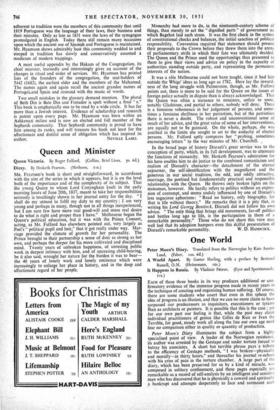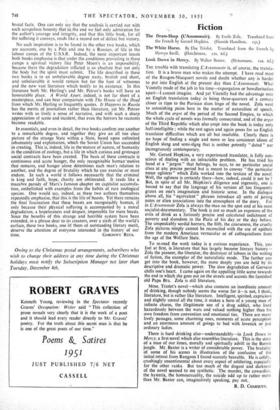One World
EACH of these three books in its way produces additional or con- firmatory evidence of the immense progress made in recent years in the technique of creating and organising human suffering. Of course, there are some students who assert that even in this sphere the idea of progress is an illusion, and that we can no more claim to have surpassed our predecessors as inquisitors, executioners or tyrants than as architects or painters. It is possible that this is the case ; yet for our own part our feeling is that, while the past may claim individual practitioners of genius like Gillis de Rais or Ivan the Terrible, for good, steady work all along the line our own age need fear no comparison either in quality or quantity of production.
Peter Moen's Diary illuminates the subject from a highly specialised point of view. A leader of the Norwegian resistance, its author was arrested by the Gestapo and under torture forced to betray his associates. A short but terrible phrase pays 'a tribute to the efficiency of Gestapo methods, " I was broken—physically and morally—in thirty hours," and thereafter his journal re-echoes with his cries of pain in the torture chamber. A large part of the diary, which has been preserved for us by a kind of miracle, was composed in solitary confinement, and these pages especially are remarkable as a record of self-analysis by an intelligent and sensitive man who has discovered that he is physically a coward and spiritually a bankrupt and attempts desperately to face and surmount such brutal facts. One can only say that the analysis is carried out with such scrupulous honesty that in, the end we feel only admiration for the author's courage and integrity, and that this little book, for all the suffering it conveys, reads like a record not of defeat but victory.
No such inspiration is to be found in the other two books, which are accounts, one by a Pole and one by a Russian, of life in the labour camps of the U.S.S.R. Indeed, the most important lesson both books emphasise is that under the conditions prevailing in these camps a spiritual victory like Pet& Moen's is an impossibility, because there the degradation inflicted is so absolute that not only the body but the spirit must submit. The life described in these two books is to an unbelievable degree nasty, brutish and short, and unbelievable it would remain but for the host of witnesses and the now vast literature which testify to its existence. In this literature both Mr. Herling's and Mr. Petrov's books will have an honourable place. A World Apart, indeed, is not far short of a masterpiece, and can bear comparison with The House of the Dead from which Mr. Herling so frequently quotes. It Happens in Russia has the merits of journalism rather than literature, yet Mr. Petrov writes with so lively a sense of narrative, and with such a sharp appreciation of scene and incident, that even the horrors he recounts become readable.
In essentials, and even in detail, the two books confirm one another to a remarkable degree, and together they give an all too clear picture of the strange State within. a State, based upon unlimited inhumanity and exploitation, which the Soviet Union has succeeded in creating. This is, indeed, life in the-stature of nature, of humanity in the condition of zoology, but a life in which curious and grotesque social contracts have been created. The basis of these contracts is continuous and acute hunger, the only recognisable human'motive that remains, and hunger alone determines each man's relation to another, and the degree of brutality which he can exercise or must endure. In such a world it follows necessarily that the criminal is king and faith, hope, charity are obliterated. It reads like a macabre parody of Marx's famou4 chapter on capitalist accumula- tion, embellished with examples from the habits of rare zoological species. One would say, indeed, as these two authors themselves repeatedly emphasise, that this is the life of beasts. Yet there remains the final fascination that these beasts are recognisably human, if only because their physical suffering is accompanied by a moral degradation, a hopelessness and despair, impossible for mere beasts. Since the benefits of this strange and horrible system have been extended, in a phrase dear to its creators, over a sixth of the world's surface, these two books, one bf them of outstanding literary merit, deserve the attention of everyone interested in the history of our



































 Previous page
Previous page